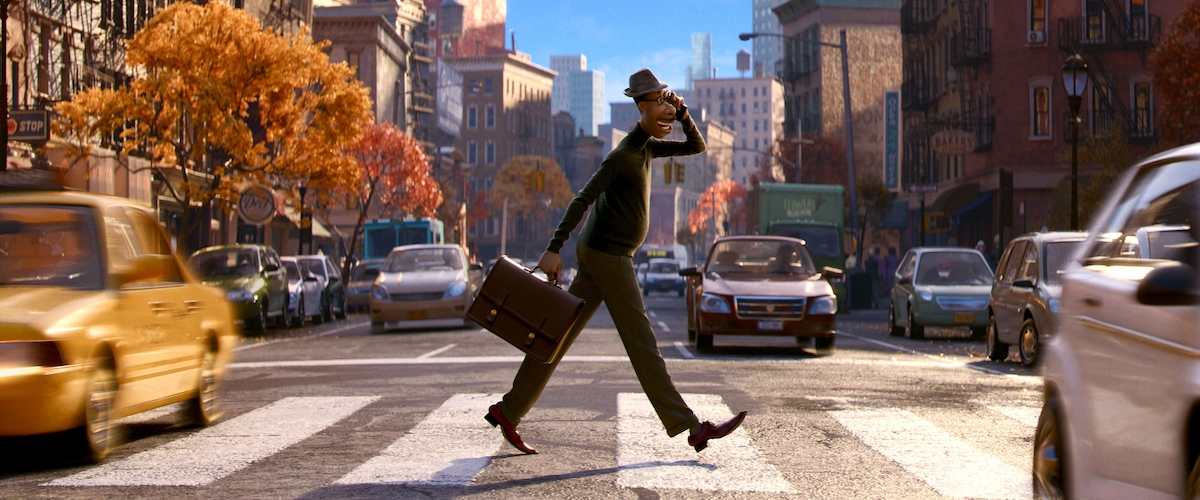Movie Info
Movie Info
- Director
- Pete Docter and Kemp Powers
- Run Time
- 1 hour and 40 minutes
- Rating
- PG
VP Content Ratings
- Violence
- 1/10
- Language
- 2/10
- Sex & Nudity
- 0/10
- Star Rating
Relevant Quotes
God saw everything that he had made, and indeed, it was very good.
“You are the salt of the earth; but if salt has lost its taste, how can its saltiness be restored? It is no longer good for anything, but is thrown out and trampled under foot.
In all this I have given you an example that by such work we must support the weak, remembering the words of the Lord Jesus, for he himself said, ‘It is more blessed to give than to receive.’

For a family film Pixar’s Soul about a jazz pianist takes on hefty, metaphysical, themes—life and death, the appreciation of the former and one’s purpose in living. Its co-directors are Pete Docter (Up, Inside Out) and playwright/screenwriter Kemp Powers (writer of Regina Kin’s One Night in Miami). Like all Pixar films, the film will appeal to the imagination and challenge the minds of young and old.
Joe Gardner (Jamie Foxx) feels stuck in life as a part-time middle school music instructor in Queens, urged by his mother , Libba (Phylicia Rashad) to give up his dream of a career in jazz piano and accept the security promised by the school’s offer of a full time position. However, when he wins a trial gig with famous saxophonist Dorothea Williams (Angela Bassett), he is filled with hope. However, while crossing a street he fails to notice an open manhole. He falls down it, and…
Finds himself on a giant travellator moving toward a bright light called “The Great Beyond.” Learning that he has died, he revolts and tries to escape. He finds himself in “The Great before” where souls are prepared for birth. Each soul has a badge which has to be filled out with traits and a spark before entering existence. The trainers or soul counselors are all named Jerry. Mistaken for one of these, Joe is assigned the cynical 22 (Tina Fey) who for millennia has been refusing to be born. After many tries, 22 remains as adamant as ever that she does want to be born.
I won’t try to go into all the details of their venture into the Zone where lost souls reside in despair. With help from a soul named Moonbeam Joe is able to return to earth, but 22 accidentally accompanies him. In a crazy mix-up 22 enters Joe’s battered body in the hospital and Joe takes up residence in the therapy cat. In subsequent scenes Joe/22 experiences the delights of eating pizza and such; he meets with his reluctant student Connie, and, discovering she has great talent, convinces her not to go through with her plans to drop out of his class; they visit the barber shop where Dez repairs his damaged hair; and Joe reconciles with his mother who presents him the suit of his deceased father, who also had dreamed of becoming a musician. These experiences change both Joe and 22, but there are further complications that lead to a temporary falling out between the two before the two can move toward their destinies. Joe still has more to learn, he discovers, before he and 22 can move on in life.
Though concerned with the metaphysics of life and death, religion does not figure in the film. There is no mention of Joe or his mother belonging to any church or of them praying to God. The plot blends the dualism of Neo-Platonism with Hindu concepts of reincarnation and the transmigration of souls. However, setting aside the filmmaker’s metaphysics, people of faith can affirm the film’s teaching of appreciating and entering fully the present and also that one’s “spark,” that is pursuit of a passionate interest, is not really what one’s life is all about.
Joe declares, “Music is all I think about. From the moment I wake up in the morning… to the moment I fall asleep at night. I was born to play. It’s my reason for living.” This is good, but only to an extent, the film says, the point being made in the barber shop scene where Joe/22 enters into a conversation instead of a monologue with Des. For the first time Joe listens to his barber, learning that the man had hoped to become a veterinarian but, lacking tuition money, became a barber instead. Des comments that he is both good at his trade and now thoroughly enjoys it. Joe says that he had not known any of Des’s past, and Des says that is because he (Joe) had talked only about jazz during his haircuts—in other words, only about himself.
Joe also discovers that achieving his dream of playing a jazz gig with the famous Dorothy is less a high than he thought it would be. Before his travels with 22, as well as during their further adventures, he had been wrapped in his own dreams, heedless of others. I think his support and pursuit of the estranged 22 is a secular working out of what Jesus taught in his Sermon on the Mount in his metaphor about salt, meaning that we do not exist for ourselves but for one another. This is backed up by the apostle Paul’s reminder that giving is greater than receiving. By what Joe does, he demonstrates that he has accepted this. It is a Jerry who brings him to an awareness of this:
Joe: We never found out what 22’s purpose was.
Jerry: Excuse me?
Joe: You know, her spark. Her purpose. Was it music? Biology? Walking?
Jerry: We don’t assign purposes. Where did you get that idea?
Joe: Because I have piano. It’s what I was born to do. That’s my spark.
Jerry: A spark isn’t a soul’s purpose. Oh, you mentors and your passions. Your “purposes.” Your “meanings of life.” So basic.
In Joe’s earlier life music is what he lives for. He had been wrapped up in himself, but subsequently, when he is incased in the cat’s body and watches his former body (infused with 22), he becomes aware of his self-centeredness. There are times when we do need to stand outside ourselves to obtain a clear picture of who or what we are—and sometimes that picture is not pretty. Joe sees how Connie is changed by Joe’s advocacy for her newly discovered musical talent, and then how Joe had been so self-absorbed during all those haircuts, talking about music and himself, that he had never learned of the barber’s dreams and acceptance of his fate. It is a changed Joe whom Jerry asks toward the end of the film, “So what do you think you’ll do? How are you gonna spend your life?” Joe responds, “I’m not sure. But I do know… I’m going to live every minute of it.” I thought of the apostle Paul’s phrase about a person affected by Christ, a “new” being.
22, of course, also goes through great change, from that of denying life to affirming it. Indeed, in the delightful pizza scene she discovers what the author of Genesis affirms, that all of creation is not just “good,” but “very good.”
As expected of a Pixar film, the animation is excellent, varying from the realistic renditions of the city streets and shops to the simpler drawings in the afterlife sequences. Adding greatly to the enjoyment is John Batiste’s jazz numbers that are combined with the musical score by Trent Reznor and Atticus Ross. This is a film to be enjoyed from virtually very angle—thanks to its superb visual art, music, voice acting, and moral and spiritual insight.
This review will be in the February issue of VP along with a set of questions for reflection and/or discussion. If you have found reviews on this site helpful, please consider purchasing a subscription or individual issue in The Store.

